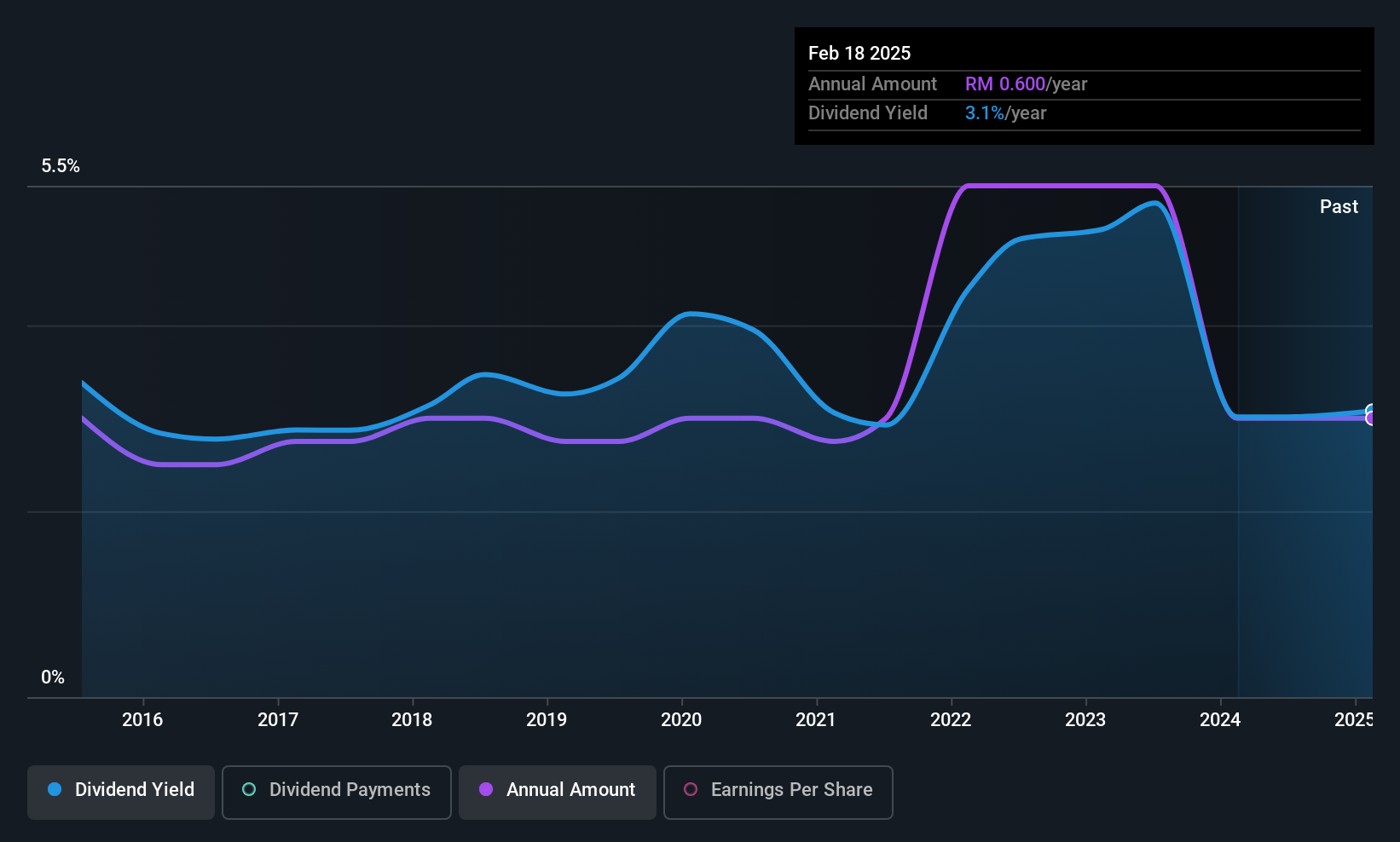Batu Kawan Berhad (KLSE:BKAWAN) Is Paying Out A Dividend Of MYR0.20
Batu Kawan Berhad (KLSE:BKAWAN) will pay a dividend of MYR0.20 on the 31st of July. Based on this payment, the dividend yield will be 3.2%, which is fairly typical for the industry.
Batu Kawan Berhad's Future Dividend Projections Appear Well Covered By Earnings
While it is always good to see a solid dividend yield, we should also consider whether the payment is feasible. Prior to this announcement, Batu Kawan Berhad's dividend was making up a very large proportion of earnings, and the company was also not generating any cash flow to offset this. This is a pretty unsustainable practice, and could be risky if continued for the long term.
Looking forward, earnings per share could rise by 3.8% over the next year if the trend from the last few years continues. If the dividend continues on this path, the payout ratio could be 74% by next year, which we think can be pretty sustainable going forward.

See our latest analysis for Batu Kawan Berhad
Dividend Volatility
The company's dividend history has been marked by instability, with at least one cut in the last 10 years. The most recent annual payment of MYR0.60 is about the same as the annual payment 10 years ago. We're glad to see the dividend has risen, but with a limited rate of growth and fluctuations in the payments the total shareholder return may be limited.
Dividend Growth May Be Hard To Achieve
Growing earnings per share could be a mitigating factor when considering the past fluctuations in the dividend. However, Batu Kawan Berhad has only grown its earnings per share at 3.8% per annum over the past five years. There are exceptions, but limited earnings growth and a high payout ratio can signal that a company has reached maturity. This isn't the end of the world, but for investors looking for strong dividend growth they may want to look elsewhere.
Our Thoughts On Batu Kawan Berhad's Dividend
Overall, it's nice to see a consistent dividend payment, but we think that longer term, the current level of payment might be unsustainable. While Batu Kawan Berhad is earning enough to cover the payments, the cash flows are lacking. We don't think Batu Kawan Berhad is a great stock to add to your portfolio if income is your focus.
Investors generally tend to favour companies with a consistent, stable dividend policy as opposed to those operating an irregular one. At the same time, there are other factors our readers should be conscious of before pouring capital into a stock. For example, we've identified 3 warning signs for Batu Kawan Berhad (2 don't sit too well with us!) that you should be aware of before investing. Is Batu Kawan Berhad not quite the opportunity you were looking for? Why not check out our selection of top dividend stocks.
Valuation is complex, but we're here to simplify it.
Discover if Batu Kawan Berhad might be undervalued or overvalued with our detailed analysis, featuring fair value estimates, potential risks, dividends, insider trades, and its financial condition.
Access Free AnalysisHave feedback on this article? Concerned about the content? Get in touch with us directly. Alternatively, email editorial-team (at) simplywallst.com.
This article by Simply Wall St is general in nature. We provide commentary based on historical data and analyst forecasts only using an unbiased methodology and our articles are not intended to be financial advice. It does not constitute a recommendation to buy or sell any stock, and does not take account of your objectives, or your financial situation. We aim to bring you long-term focused analysis driven by fundamental data. Note that our analysis may not factor in the latest price-sensitive company announcements or qualitative material. Simply Wall St has no position in any stocks mentioned.
About KLSE:BKAWAN
Batu Kawan Berhad
An investment holding company, cultivates and processes palm and rubber products in Malaysia, the Far East, the Middle East, South East Asia, Southern Asia, Europe, North and South America, Australia, Africa, and internationally.
Mediocre balance sheet with low risk.
Similar Companies
Market Insights
Community Narratives


Recently Updated Narratives


MINISO's fair value is projected at 26.69 with an anticipated PE ratio shift of 20x


The Quiet Giant That Became AI’s Power Grid


Nova Ljubljanska Banka d.d will expect a 11.2% revenue boost driving future growth
Popular Narratives


The company that turned a verb into a global necessity and basically runs the modern internet, digital ads, smartphones, maps, and AI.


MicroVision will explode future revenue by 380.37% with a vision towards success




